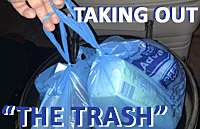


“Taking Out the Trash” is Not a Crisis Management Option
[by Howard Fencl & Thom Fladung, Hennes Communications]
Memorial Day – just last weekend – may already be a wistful memory for you. If you watched local TV news – and almost no one does on holiday weekends – you know it was dominated by stale, cliché, perennial coverage of barbeque tips, parades, gas prices and airport traffic, just like the “evergreen” stories you see every other holiday.
It’s not unusual for newsrooms to have just one street reporter for the holiday weekend day shift covering all three days, along with a couple of videographers who split the first and second shifts. Oh, and aside from news, the videographers have to cover sports, get weather beauty shots and maybe set up for live shots, making them unavailable for the length of a newscast. That doesn’t give assignment editors a lot of latitude to cover other breaking issues that are clearly newsworthy.
Like your layoff announcement. Or the fact that your board suddenly fired your CFO over raunchy late-night tweets. Or your data breach news that a hacker stole the Social Security numbers of thousands of your customers.
Many organizations, politicians and government agencies have tried to fly bad news under the media radar by releasing it at times when TV stations are least likely to cover it. It’s a sneaky tactic called “taking out the trash.” When do you send the ugly press release you hope won’t get coverage?
- Holidays and/or Fridays – anticipating typically thin staffing in TV newsrooms.
- Major news events – for example, a significant local breaking news story or a severe weather event ties up staff, which usually means less scrutiny is given to the crush of daily incoming press releases.
- Sweeps – TV stations are so over-programmed with investigative series and promotable content during “sweeps” rating periods, that producers may have little time left to cover other news. Significant stories can get short shrift – or be ignored entirely – as a result.
The same held true for the print side of news – especially for business reporters at newspapers, who became adept in the pre-Internet era at watching the fax machines closely after 5 p.m. on Fridays. At many newspapers, it became known as the “Friday night news dump.” Publicly traded businesses had the added motivation of timing bad news releases after the markets closed and just before the Security and Exchange Commission offices closed.
Indeed, the Wall Street Journal documented the phenomenon in 2012, working with Morningstar on an analysis that showed 8.5% of all 8-K filings – notifications to investors of important events – were filed after 4 p.m. Eastern on Fridays. If disclosures were submitted evenly across the SEC’s filing hours, that figure should have been 2.6%, the WSJ reported.
Taking out the trash in this manner had the added feature of the organization’s spokespersons then being out of the office and unavailable to comment about the bad news. The common joke among journalists was that CEOs hit “send” on the fax button – or ordered it to be hit – and then sprinted to their cars to start the weekend.
It’s an approach we never recommend. It’s a serious reputation risk, and it’s a tactic that’s getting tougher to pull off. Remember, TV is no longer linear, delivering programming on an established broadcast schedule solely over-the-air. And newspapers aren’t hostage to when the presses run. Your bad news may not fit into a station’s 6 p.m. broadcast or make a newspaper’s print deadline, but you can be sure a web editor will post your release verbatim on the media outlet’s website. It’ll also find its way to the news outlet’s social media platforms, where it will likely be shared by readers. If there are enough clicks, TV and print newsrooms will assign reporters to cover your news once the long holiday weekend is over, the ratings period ends or their personnel crunch eases up after covering a major news event.
In addition, social media sharing now carries the greater risk of your employees or other stakeholders learning of the news on Facebook or Twitter rather than from you. That’s one of the primary missteps that puts reputations at risk on social media.
Let me assure you that every newsroom ALWAYS has a reporter keeping an eagle eye out for this sneaky tactic. They’re the ones who sit in daily editorial meetings and ask: “What are we missing because of the holiday weekend? What are we missing because of all the stuff we’re already covering?”
As painful as it seems, when you have bad news to report, it’s best to just rip the Band-Aid off. Tell the truth. Tell it all. Tell it first and tell it fast. The result may be a one day news story that goes away when the media is on to the next big story.